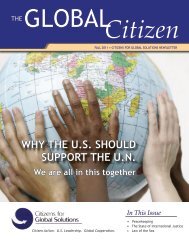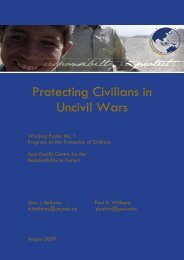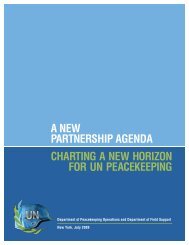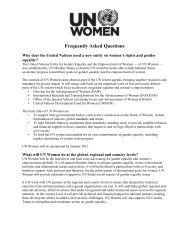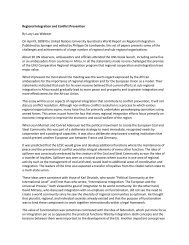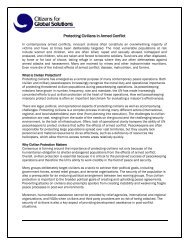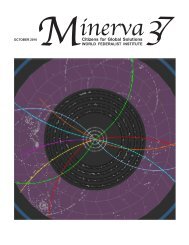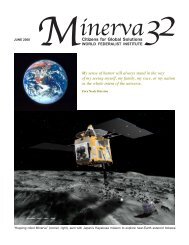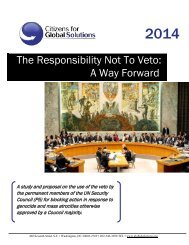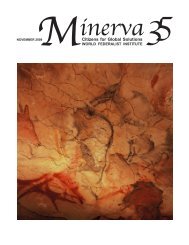Minerva, Fall 2011 - Citizens for Global Solutions
Minerva, Fall 2011 - Citizens for Global Solutions
Minerva, Fall 2011 - Citizens for Global Solutions
- No tags were found...
Create successful ePaper yourself
Turn your PDF publications into a flip-book with our unique Google optimized e-Paper software.
adequately in their current conditions.There was also an examination of thevarious international courts and councilsthat could address harms and subsequentremedies that would include the restorationof human rights and dignity of peopleaffected by rising seas submerging theirhomelands. The commitment to creativeadaptation options to remain as long aspossible with structural projects throughinnovative designs was also included respectingthe desire of indigenous peoplesto remain in their own sacred lands.Marshall Island President Jurelang Zedkaiagave the keynote address, “As oneof the world’s lowest-lying island nations– comprised of narrow atolls less thantwo meters above sea level – our verystatehood is at risk. We know this notonly because of what scientists tell us, butbecause we are seeing it every day withour own eyes. It is as though everythingaround us, our culture, our communities,our traditions, our land – and in fact ourvery livelihoods – are now in jeopardy. “Zedkaia stated that time <strong>for</strong> merely talkingis over: “We can no longer af<strong>for</strong>d onlyto draw your attention to our unique vulnerabilities.We must now work togetherto recognize and directly address theserisks. There has been enough talk. Now— starting tonight — it is time <strong>for</strong> a realitycheck. It is time <strong>for</strong> action. It is timewe took charge of our future.”The president noted that casual conversationsabout climate change has to changeits tone, as people will be affected directlyin unimaginable ways around theworld, especially Oceania. His statementemphasized that what small islands facesoon eventually will swallow the largerstates’ concerns about basic human rightsbut also national security. “As a leader, Ican assure you that casual discussions onrelocation are an irresponsible politicalexercise. But it is now … not so distan[t]— relocation is also an undeniable threatknocking at our door, and somethingwhich could well unfold in decades tocome. It is a threat that the internationalcommunity is presently unprepared to address,and it can no longer be ignored.”He closed: “In all eventualities, the sovereignstate, the security and human rights,and the culture of the Marshallese mustand will be protected. I am committed tono less….”Marshall Islands Ambassador Phillip Muellerexpressed the sentiment of sacrednessregarding climate change and itsimpact on island communities: “Land isour identity not an interchangeable commodity.It is the center of our lives andcollective culture. The impact of climatechange must be addressed in [terms] ofour sovereignty but also [as] a threat toour very identity.”The Marshall Islands Ambassador concluded:“We are a small island state butwe are unique. Losing our islands wouldmean losing something beautiful in ourworld we share. We are small. We needthe help of the international community.But, we are the ones making decisionsnow and it is our responsibility.”Another representative of the Marshall Islands,Senator Fred Mueller, stated: “Landis more than an asset. Is the very fabric ofour familial identity…Why don’t we justmove somewhere else is not a simple solutionand would not be asked if peopleunderstand the fundamental relationshipwe have with our land.”Law Professor Michael Garrard, whoheads the Center <strong>for</strong> Climate ChangeLaw, pointed out: “The residents of thesecountries want to stay as long as theycan. They are no way surrendering theirancestral homelands to the rising seas.”Jenny Grote Stoutenburg (University ofCali<strong>for</strong>nia-Berkeley) noted: “There is amoral and legal duty to continue to recognizeisland states.”Cape Verde Ambassador Antonio Limasummarized the core concern facing humanityin the 21st century: “If we are notunited to struggle and understand, if wedon’t take the point of view of the SmallIsland Developing States as our commonsurvival…, we are not doing the rightthing.” He continued calmly: “There areconsequences. Can we have solidaritywith these islands that will disappear?They are only the first to go. We are thesentinels of the world. It will happen toall tomorrow. If we don’t succeed to save31 • <strong>Minerva</strong> #39 • November <strong>2011</strong>them, we are condemning ourselves….We are all linked together.”A strength of the seminar was linkage ofhuman rights and climate change in publicinternational law <strong>for</strong> a strong strategyof steps <strong>for</strong>ward to secure fundamentalfreedoms. The meeting inspired a coalitionmovement to address climate changethrough a human rights framework.The movement’s momentum continuesthrough various conferences, conventions,and councils in international law. Climatechange is an important issue that will continueto be on the diplomatic agenda butrequires action in our daily living practiceaugmenting diplomatic pressure on allstates to strengthen and respect environmentallaw.VI • UNSC and climate change ~ Theprimary institution dealing with securityissues in international affairs is the UnitedNations Security Council. Once in itshistory, in 2007, the Council’s time wasdedicated — beyond traditional war &security <strong>for</strong>mulations — to discussion ofglobal warming and human security. Thisyear, with the leadership of Germany andsupport of Portugal, the UNSC scheduleda meeting on 20 July to consider climatechange and security impacts. The OpenDebate on Climate Change and Securitywent beyond allotted time into the eveninghours; yet a majority of states agreedthat there is much more to be said andeven more action necessary to promotepeace.Secretary General Ban Ki-moon openedthe debate, challenging states questioningwhether such a topic is appropriate. “Wemust make no mistake,” he said. “Thefacts are clear: climate change is real; it isaccelerating in a dangerous manner; andit not only exacerbates threats to internationalpeace and security, it is a threat tointernational peace and security.”The Secretary General laid out the reasoning<strong>for</strong> authentic action by the SecurityCouncil and all member-states of the UN,while announcing alarm about the newera of environmentally sparked securitychallenges. “Around the world, hundredsof millions of people are in danger of go-



